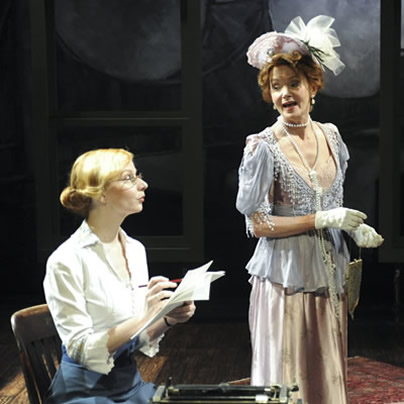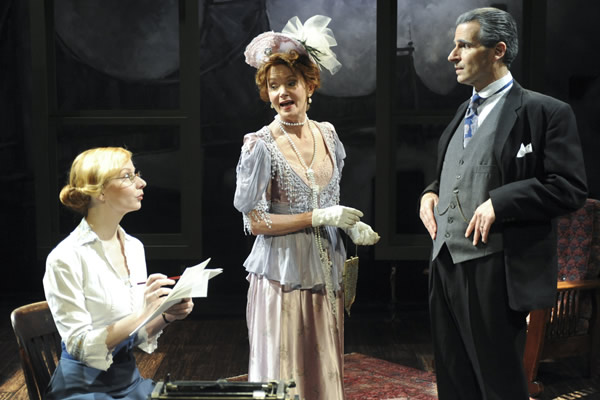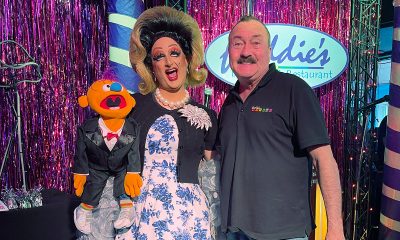Arts & Entertainment
Typing and telepathy
Charming drama poses death as mere inconvenience


From left, Susan Lynskey, Helen Hedman and Paul Morella in ‘Ghost-Writer.’ (Photos by Christopher Banks; courtesy MetroStage)
‘Ghost-Writer’
Through June 16
MetroStage
1201 North Royal Street Alexandria
$45-$55
800-494-8497
metrostage.org
It’s not every day that a respectable secretary with a talent for punctuation becomes fodder for New York City’s tabloid press, but in Michael Hollinger’s 2010 drama “Ghost-Writer” (now at MetroStage) that’s just what happens.
When popular novelist Franklin Woolsey (Paul Morella) drops dead in the middle of dictating his latest book, loyal typist Myra Babbage (Susan Lynskey) forges ahead, channeling her beloved boss’ words from the beyond. While Myra’s unorthodox approach to wrapping things up is a hit with Woolsey’s editor and the curious public, the novelist’s jealous widow is none too thrilled.
Set in 1919 Manhattan, the odd workplace tale unfolds in Woolsey’s comfortable but unpretentious studio. Myra is seated at her typing table facing an unseen investigator (the audience). In wordy monologue and flashbacks she relays just how she came to be a literary medium.
Fresh out of secretarial school, Myra’s hired to take dictation from the businesslike Woolsey. A whiz at the clunky manual typing machine, she never misses a word. As weeks become months and then years, she respectfully but firmly corrects his punctuation and eerily develops the ability to anticipate his prose. The process moves to the outskirts of collaboration, and a close but chaste relationship evolves. There is no longer any mention of Thursday night dance classes or potential husbands. As Myra becomes more heavily immersed in Woolsey and his work, outside distractions fade away. Her focus narrows.
Occasionally the formidable and fashionably turned out Mrs. Woolsey (Helen Hedman) pays unannounced visits to her husband’s studio. A dilettante poet who once transcribed her husband’s novels by hand, she resents her husband’s secretary. After all it is Myra with whom Woolsey spends the lion’s share of his waking hours. And while she finds some comfort that Myra is less pretty than her predecessor, Mrs. Woolsey would still rather she go away. But Myra isn’t cowed; the studio is her domain and Woolsey belongs partly to her too.
“Ghost-Writer” is cleanly staged by John Vreeke (who is gay). In lesser hands, this delicately rendered memory play/ghostly mystery/love story might be a sappy mishmash, but Vreeke’s direction is insightfully keen and well-ordered and his outstanding three-person cast gives thoughtful, restrained performances. He’s also assembled a particularly cohesive design team. Together Alexander Keen’s evocative lighting, Jane Fink’s suggestion of walls and Robert Garner’s distant dance class music and steam whistle from the East river, play beautifully to the concepts of memory and the metaphysical.
At first glance, Lynskey’s Myra is the picture of no-nonsense practicality — pulled back hair and plain attire. But keep looking and you’ll detect a sly smile and twinkly eye behind the steel-rimmed spectacles; her character is no mere typing automaton. Her Myra has an inner world filled with romance and the flourishes of art and music. For her, awaiting Woolsey’s next utterance is an exquisite pleasure. Typing each page is an adventure. Lynskey captures all the layers.
Morella is terrific as Woolsey. He affectively melts from brusque boss to kindly colleague. And as Mrs. Woolsey, Hedman is a marvelous balance of overbearing and vulnerable. It’s a touching performance.
“Ghost Writer” is inspired by the real life happenings of famed gay novelist Henry James and his longtime secretary Theodora Bosanquet. Like Myra, the devoted Bosanquet did what she could to keep the literary master’s words flowing. Unlike Myra, she didn’t hold a torch for her boss. Bosanquet reportedly preferred women.
a&e features
Eastern Shore chef named James Beard Finalist
Harley Peet creates inventive food in an inclusive space

In a small Eastern Shore town filled with boutiques, galleries, and the occasional cry of waterfowl from the Chesapeake, Chef Harley Peet is most at home. In his Viennese-inflected, Maryland-sourced fine-dining destination Bas Rouge, Peet draws from his Northern Michigan upbringing, Culinary Institute of America education, and identity as a gay man, for inspiration.
And recently, Peet was named a James Beard Finalist for Best Chef: Mid-Atlantic – the first “Best Chef: Mid-Atlantic” finalist representing the Eastern Shore.
Peet, after graduation from the Culinary Institute of America, took a position as sous chef at Tilghman Island Inn, not far from Bas Rouge. Falling in love with the Eastern Shore, he continued his passion for racing sailboats, boating, gardening, and fishing, and living his somewhat pastoral life as he opened Bas Rouge in 2016 as head chef, a restaurant part of the Bluepoint Hospitality group, which runs more than a dozen concepts in and around Easton, Md.
Coming from a rural area and being gay, Peet knew he had his work cut out for him. He was always aware that the service and hospitality industry “can be down and dirty and rough.”
Now as a leader in the kitchen, he aims to “set a good example, and treat people how I want to be treated. I also want to make sure if you’re at our establishment, I’m the first to stand up and say something.”
The Bas Rouge cuisine, he says, is Contemporary European. “I’m inspired by old-world techniques of countries like Austria, Germany, and France, but I love putting a new spin on classic dishes and finding innovative ways to incorporate the bounty of local Chesapeake ingredients.”
His proudest dish: the humble-yet-elevated Wiener Schnitzel. “It is authentic to what one would expect to find in Vienna, down to the Lingonberries.” From his in-house bakery, Peet dries and grinds the housemade Kaiser-Semmel bread to use as the breadcrumbs.
Peet works to support the LGBTQ community inside and outside of the kitchen. “I love that our Bluepoint Hospitality team has created welcoming spaces where our patrons feel comfortable dining at each of our establishments. Our staff have a genuine respect for one another and work together free of judgment.”
Representing Bluepoint, Peet has participated in events like Chefs for Equality with the Human Rights Campaign, advocating for LGBTQ rights.
At Bas Rouge, Peet brings together his passion for inclusion steeped in a sustainability ethic. He sees environmental stewardship as a way of life. Peet and his husband have lived and worked on their own organic farm for several years. Through research in Europe, he learned about international marine sourcing. Witnessing the impacts of overfishing, Peet considers his own role in promoting eco-friendly practices at Bas Rouge. To that end, he ensures responsible sourcing commitments through his purveyors, relationships that have helped create significant change in how people dine in Easton.
“I have built great relationships in the community and there’s nothing better than one of our long-standing purveyors stopping in with a cooler of fresh fish from the Chesapeake Bay. This goes especially for catching and plating the invasive blue catfish species, which helps control the species’ threat to the local ecosystem.
Through his kitchen exploits, Peet expressed a unique connection to another gay icon in a rural fine-dining restaurant: Patrick O’Connell, of three Michelin starred Inn at Little Washington. In fact, Peet’s husband helped design some of O’Connell’s kitchen spaces. They’ve both been able to navigate treacherous restaurant-industry waters, and have come out triumphant and celebrated. Of O’Connell, Peet says that he “sees [his restaurants] as canvas, all artistry, he sees this as every night is a show.” But at the same time, his “judgment-free space makes him a role model.”
Being in Easton itself is not without challenges. Sourcing is a challenge, having to either fly or ship in ingredients, whereas urban restaurants have the benefit of trucking, he says. The small town “is romantic and charming,” but logistics are difficult – one of the reasons that Peet ensures his team is diverse, building in different viewpoints, and also “making things a hell of a lot more fun.”
Reflecting on challenges and finding (and creating) space on the Eastern Shore, Peet confirmed how important it was to surround himself with people who set a good example, and “if you don’t like the way something is going, fuck them and move on.”

Team DC, the umbrella organization for LGBTQ-friendly sports teams and leagues in the D.C. area, held its annual Night of Champions Awards Gala on Saturday, April 20 at the Hilton National Mall. The organization gave out scholarships to area LGBTQ student athletes as well as awards to the Different Drummers, Kelly Laczko of Duplex Diner, Stacy Smith of the Edmund Burke School, Bryan Frank of Triout, JC Adams of DCG Basketball and the DC Gay Flag Football League.
(Washington Blade photos by Michael Key)




















The 2024 National Cannabis Festival was held at the Fields at RFK Stadium on April 19-20.
(Washington Blade photos by Michael Key)
















Covering the @NatlCannaFest at RFK Stadium for @WashBlade . Stop by the LGBTQ+ booth and pick up a paper if you are here. pic.twitter.com/is7hnsaPns
— Michael Patrick Key (@MichaelKeyWB) April 20, 2024




















